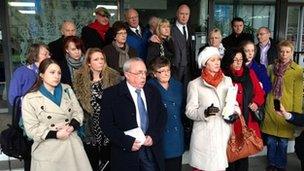Stafford Hospital public inquiry: 'NHS needs urgent reform'
- Published
Ron Street's "soul mate" died at Stafford Hospital after she was not given insulin for her diabetes
The families of patients who died at Stafford Hospital want the NHS to be reformed after a public inquiry.
A report from Robert Francis QC has strongly criticised hospital managers and the Department of Health.
The 12-month inquiry, which cost £13m, was the fifth of its kind after a higher-than-expected number of deaths at the hospital between 2005 and 2008.
Derek Locke, whose daughter Jane died in 2006, said it was important Robert Francis's measures were implemented.
He said: "290 recommendations. I would be happy if only half of them were implemented.
"It's all right recommending them, we want to see them in practice and working."
His wife June said: "We lost a daughter and you can't get over that.
"But we have to hope this hospital can carry on in some form, because we need this hospital."
Christine Dalziel, from Rugeley, whose 64-year-old husband George died following treatment at Stafford Hospital in 2007, said she hoped the measures put forward by Robert Francis would protect future patients.
Following the publication of the inquiry Prime Minister David Cameron issued a public apology to the families in the House of Commons.

Many of the families travelled to London for the publication of Robert Francis's report
'Rightly damning'
Emma Jones, a lawyer representing 120 of the victims and their families, welcomed the report's recommendations.
She said the "zero-tolerance" measures put forward by Robert Francis needed to be implemented quickly.
"The NHS needs urgent reform to regain its position as a healthcare system which we can all be proud of," she said.
"It needs to be down to ensuring that the regulator has teeth."
Some Stafford residents have said they fear the hospital might close following the report.
Mid Staffordshire NHS Foundation Trust said it accepted the report and that actions had already been taken to improve care.
Chief executive Lynn Hill-Tout, who took over in 2009, said: "We apologise unreservedly that the board at Mid Staffs Foundation Trust and individuals working for the trust failed in their primary responsibility to keep all patients safe and to care for patients with the compassion and dignity they deserved.
"The report is rightly damning of Mid Staffs at that time. We have learned the hard way."
She said the standard of care at the hospital had improved considerably since 2008.
'Let down'
Some 400 more patients died at the hospital than would normally have been expected between 2005 and 2008.
Julie Bailey started the Cure The NHS campaign after her mother died at Stafford Hospital
Robert Francis said patients had been "let down" by Stafford Hospital, which "put corporate self-interest ahead of patients".
He said a fundamental culture change was required across the NHS to create a more patient-centred approach.
The report, however, did not blame any one individual or organisation for the "disaster" at Stafford Hospital.
In a statement, NHS Midlands and East also apologised to the families of patients who died or were harmed as a result of the failings.
It said: "The care they received was appalling and it is a source of shame for all concerned that it should have ever occurred."
The statement added: "That things should have gone so terribly wrong at Stafford Hospital is a tragedy and for the part the Strategic Health Authority played in those failures, we are profoundly sorry."
Conservative MP for the area Jeremy Lefroy said it was important the report was implemented in full, for the sake of victims and their families.
Calum Paton, professor of Health Policy at Keele University, said Stafford was almost certainly not "one rotten apple" and changes needed to be brought in across the NHS.
Patients' watchdog Healthwatch Staffordshire said a set of fundamental standards of care needed to be drawn up.
A BBC West Midlands special investigation, The Hospital That Didn't Care, broadcasts on BBC One at 22.35 GMT on Wednesday, 6 February.